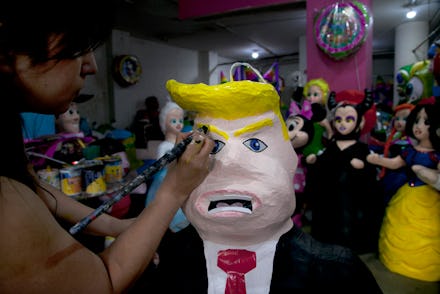Is Mexico really taking jobs from the US? Economists aren't so convinced.

Republican presidential nominee Donald Trump took to Twitter early Thursday morning to clear up any lingering confusion about whether his meeting with Mexican President Enrique Peña Nieto signaled he was softening his stance on immigration and trade.
At the heart of his campaign promise is the idea that trade agreements like the North American Free Trade Agreement — which he has called the "worst trade deal in history" — send a "tremendous" number of jobs overseas.
However the verdict on whether trade deals lead to net job loss is decidedly mixed. After all, when the United States negotiates a trade agreement, it usually gets a few things in exchange for whatever concessions are made.
There's certainly some evidence to support the notion that trade deals do in fact kill jobs, especially for less-educated Americans. But other economists argue that a lot of those jobs would have disappeared anyway at some point or another.
But when it comes to job loss directly related to Mexico, we're likely talking about a drop in the bucket.
For one, weakening the notion that the U.S. loses a "tremendous" amount of jobs to Mexico is what happened in the seven years immediately following NAFTA's passage: an economic boom that added almost 17 million jobs to the U.S. economy and drove down unemployment to 4%, according to a study from the Peterson Institute for International Economics.
"Trade with Mexico has no measurable impact on U.S. unemployment or U.S. wages, unlike trade with China," Gary Clyde Hufbauer, one of the study authors, told the Wall Street Journal.
Essentially, even if the verdict on trade deals are mixed, Mexico's just not really that big of an economy compared to the U.S. Whether it is exporting more or less to and from the U.S. just doesn't really affect us that much.